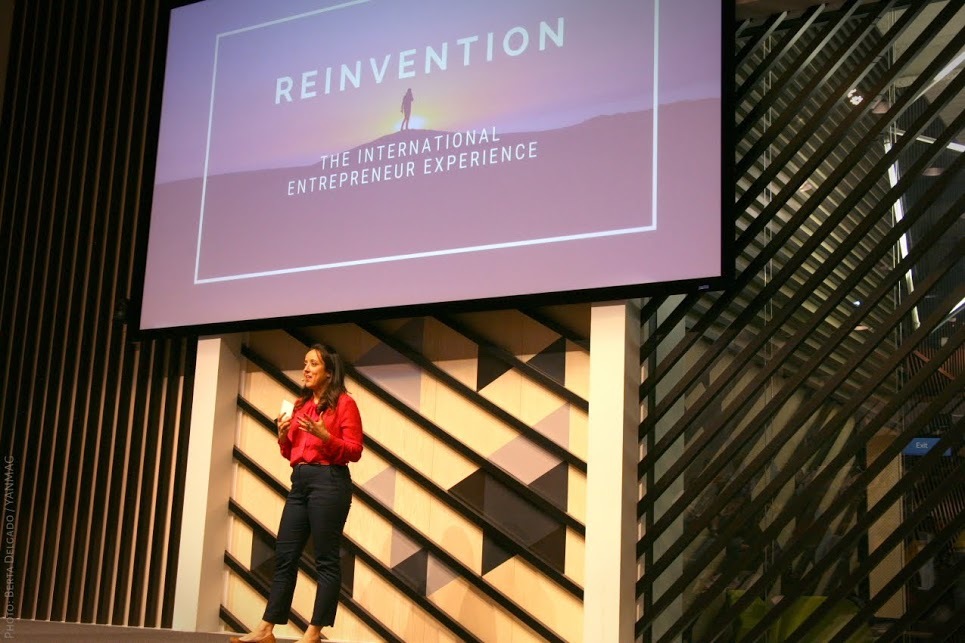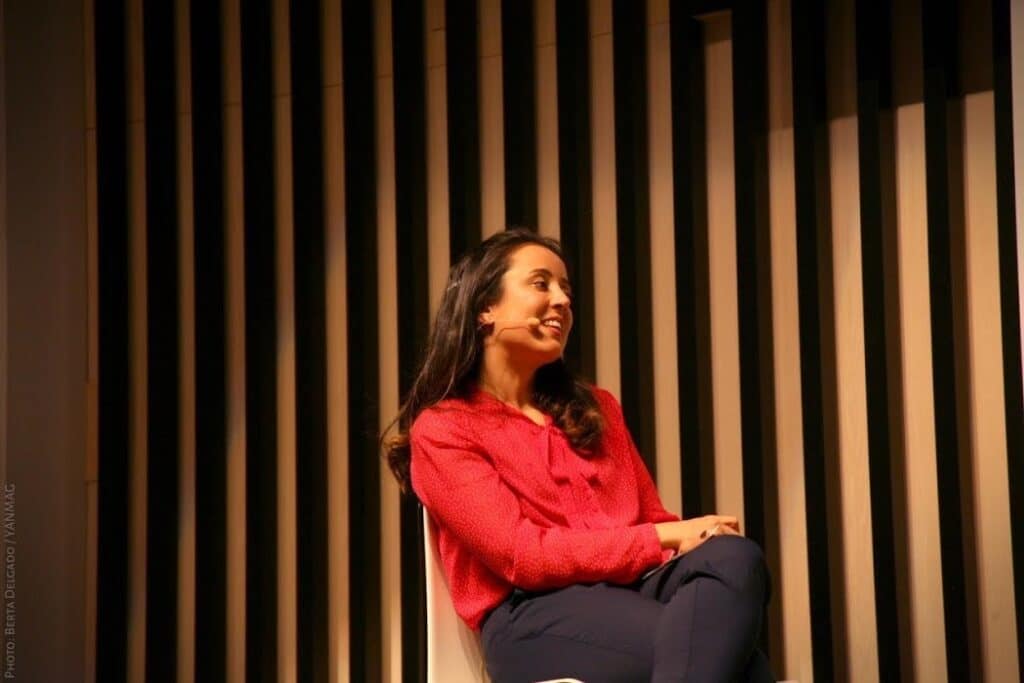Today we’re publishing a feature article by our very own CEO, Shaheen Samavati. In February 2020, she spoke about her path from journalism to entrepreneurship at an event at Google Campus in Madrid entitled “Reinvention: The International Entrepreneur Experience.” You can watch the full speech in the video above and read her story below.
The first time I was called a “boss,” it caught me by surprise.
I was at a conference in Portugal with a member of my team, and we had just checked into the hotel. She answered a phone call and said, “Sorry, I can’t talk now; I’m with my boss.”
“Who, me?” I thought.
Boss has such a negative connotation, and it certainly wasn’t a term I identified with. My company was small and nimble. Like most early-stage startups, everybody on the team worked collaboratively and had a say in decision-making. I didn’t feel like an authority figure, or even much of a leader. I certainly didn’t think of myself as a boss.
Now my company, VeraContent, is nearly four years old and turning a profit, with a team of 10–20 people working to run content channels in various European languages for global brands.
Not only has the company undergone a total transformation—so have I. I had to overhaul the way I saw myself and the business to be able to take it to the next level. And this is a journey that I’m still on; I know I’ll have to keep evolving to get to the next stage.
My strategy is continuously learning from those who successfully made the trek before me, and asking for lots and lots of help. Nobody is born with the answers, and we all need all the guidance we can get.
From entrepreneur to CEO
What has always attracted me to entrepreneurship is uniting people around an idea and working together to make it happen. I get excited about starting new projects and bouncing around ideas.
I think this kind of excitement around novelty is a big part of the entrepreneurial spirit. It’s something all of us need to have to some degree. But it’s also something you need to reign in a bit to be an effective CEO.
As an early-stage company grows, somebody needs to step up and take responsibility for keeping the organization focused. And that requires a very different set of skills that don’t always come naturally to a creative, free-spirited entrepreneur.
In my case, I realized I was the one who needed to step up. But being focused and methodical wasn’t my personality—or at least, that wasn’t how I saw myself. However, I also realized that if I didn’t change, I’d never own a thriving business.

My entrepreneurial journey
My first crack at entrepreneurship was joining a team taking part in the IE Venture Lab. I had moved to Spain for the MBA at IE Business School in Madrid back in 2010, after four years working as a technology journalist in Ohio (where I’m from).
I had lived in Ohio for most of my life before coming to Spain to study, and I’d never even been to Spain before, so it was a pretty big change.
Of course, IE has a very international and supportive community, so I felt encouraged to get involved in an entrepreneurial project pretty early on. But there was so much I didn’t know at that stage, and that first project—an app for organizing group travel—never got off the ground.
Covering technology as a journalist is what sparked my interest in entrepreneurship, but I wasn’t sure what kind of business I wanted to start and had no idea how to do it.
After the MBA, I decided to put entrepreneurship on hold for a while. I moved to Málaga, where I worked in corporate communication.
A couple of years later, I was approached by some contacts of mine with the opportunity to come back to Madrid to join real estate startup Spotahome. They wanted me to help them reach international audiences by putting everything into perfect and persuasive English.
A minority equity share, no salary and the ability to learn from seasoned entrepreneurs? I was so in! Although I did have to rent out my apartment on a certain vacation rental website to be able to pay my bills.
I spent nearly a year at Spotahome, and my role grew into a lot more than marketing and communication. I worked intensely on setting up all the tenant-facing operations, including not only marketing, but customer support and the creation and publishing of property listings.
I learned how to set up processes and how to manage a small team.
It was an amazing experience, and I learned much more about launching a business than I ever did in my MBA.
But I knew deep down that it wasn’t the right path for me. It may sound crazy now, but I left the company before it raised over $60 million in venture capital and expanded across Europe… and, unfortunately, before vesting any shares.
At that point, I had been in Spain for five years and had eaten through nearly all of my savings. It really wasn’t the best time for me to be starting another business.
That’s why I started off on a safe route. I didn’t want to go back to the corporate world but I needed to earn money fast, so I used my background in journalism and communications to pick up writing and English-language consulting gigs to pay my bills.
I did everything from writing about the Spanish economy for The Wall Street Journal to writing articles for major corporations’ websites and publications. Little did I know that this would plant the seeds for my next business venture.

How VeraContent was born
I started collaborating with my current business partners James Leahu and Daphne Binioris, creators of the online publication Naked Madrid and talented translators, on some of my client projects.
One thing led to another, and eventually we decided to join forces and create VeraContent.
We legally became a business pretty quickly, but it took much longer to become one operationally. When we first started, it was a very informal organization made up of me, James, Daphne and a few interns and freelancers.
Each partner managed our own client projects, and we each had our own work style. I was the de facto leader, but my role wasn’t official. While it was a comfortable way to work, I realized that if we continued like this the business was never going to grow.
Unlike my previous ventures, the business idea for VeraContent was really my vision. I was the driving force behind it, whereas in the past I had always played more of a supporting role and wasn’t the one making the final decisions.
About a year into it, I put it out there to both of my partners: if we were going to grow this thing, we needed leadership and structure. I knew this in theory from my past experiences and business education, but I wasn’t sure how to make it happen.
But I decided to try anyway. And for those of you who are in a similar situation, I hope to demonstrate that it’s possible to get past the mental roadblocks that can stop you from turning your company into something great.
We often think that our business isn’t working because we didn’t have the right timing, or didn’t design a good enough offering, or there’s too much competition. But business strategies and products can always be adjusted—and there’s always room to do certain things better than your competition.
What it often comes down to is that we don’t have the mental clarity to determine where to focus in order to accomplish those things, because we get too caught up in details or the daily grind. Developing this kind of focus is key to successful leadership.
Assuming the role of a leader
About a year after we founded VeraContent, I recognized that my own mindset—and the fact that I was hanging on to my identity as a writer and journalist—was holding both me and the company back. I decided to focus on my own development as a leader, and sought out leadership coaching.
The coaching sessions made me realize that I was spending most of my time on client work and totally unrelated side projects, such as writing journalism pieces and running online communities I had built over the years (such as SpainGuru).
One especially big distraction was a journalism gig that I took on; I was writing for a tech blog while also running the company. Deep down I knew that it wasn’t where I should be spending my time, but it spoke to a part of me that didn’t want to let go of my identity as a tech journalist.
Being a journalist made me feel important and comfortable, while being a CEO made me feel like an imposter.
It wasn’t an easy transition. But during that year and a half of coaching, I completely committed to the role of CEO and put all of my focus on building the business. And I haven’t looked back since.
Today my role consists of managing the leadership team, setting targets and objectives, making sure the company’s culture is thriving, and developing strategies to take the business even further.
As you can imagine, our business processes have come a long way. We now have a clear hierarchy and assigned responsibilities for every member of the team. We all use the same tools and processes, allowing us to scale up the business.
This increased focus also meant identifying ways to simplify our offerings to better meet the needs of our best clients. We went from offering a huge range of language services to focusing on the few that appealed most to our target clients: marketing directors of growth firms. Specializing has helped us stand out to the people we want to reach.
If I had remained caught up in client deadlines, I never would have had the clarity to make the kinds of strategic decisions that have led to significant growth.

Create the kind of company you want to work for
My favorite part of entrepreneurship is creating an organizational culture that I genuinely believe in and thrive in. I see VeraContent as not just a company, but a community.
My newsroom experience at American publications played a huge role in inspiring the collaborative and creative culture that’s unique to VeraContent.
Being a foreigner abroad has also given me a certain advantage. Since I don’t know how things are usually done in Spain or Europe, of course I end up doing things differently. And that’s allowed me to carve out a unique niche with my business.
That said, I never saw myself as a natural leader, and it’s taken me a long time to get used to the title of CEO.
In fact, I only started to downplay my journalism experience on LinkedIn over the past year. I started emphasizing my leadership and management experience instead, finally deciding that that’s how I want to be seen.
I used to think that a CEO needed to be super charismatic and outwardly confident all the time. But in my quest to get to know and learn from fellow entrepreneurs one on one, I found that in reality there are a lot of different leadership styles.
Many great leaders are extremely humble and even quiet and reserved—they’re just not the ones you see on TV.

How to become an effective leader
When it comes to leadership, there are two qualities that I consider to be much more important than charisma:
- The ability to truly listen and imagine what it’s like to be in others’ shoes
- The ability to tune out the noise, see the big picture and put the pieces together
Both of these skills will help you make the right decisions for your business; stay focused on the right priorities at any given time; and earn trust from your team, clients and partners.
The good news is that these are absolutely skills you can work on and develop, if leading a company is what you truly want to do.
I know from personal experience that it’s possible to change your mindset, overcome imposter syndrome and become an effective leader. Here’s how I did it.
1. Decide to commit
I made the decision to truly commit to the business and become the person I needed to be in order to run it.
The first step was asking myself the big questions: Why do I want to start a business? Where do I want to take it? How big do we want to grow? Am I willing to change to get there?
These are questions that my coach helped me figure out, and they’re worth asking (I just saved you 10,000 euros of coaching advice, so you’re welcome!). I also had hard conversations with my business partners to make sure we were all aligned toward the same goals.
2. Focus
The second step was learning how to focus. I think the late, great business thinker Stephen Covey said it best: “The main thing is to keep the main thing the main thing.”This concept is so simple, but so hard to put into practice. It’s the biggest thing that I’ve had to work on.
Learning how to stay focused is the key to being highly effective at anything you do. And as a CEO it’s essential to keep not only yourself, but your entire team focused on a common goal.
That means constantly asking yourself, “What’s the most important thing we need to be working on right now?” and setting up a framework to keep revisiting that question.
3. Keep learning
I was never big on reading, but since committing to my business I’ve started reading 20 minutes of business literature a day. I’ve applied so much of what I’ve learned to the company; it’s a very small investment for a huge payoff.
So, READ. There’s so much great information out there, easily accessible and clearly laid out in books. Don’t reinvent the wheel.
For some great book recommendations for content marketing professionals, check out this article.
4. Find support
Early on in my leadership journey, I started talking to and learning from other entrepreneurs who’d accomplished what I wanted to do.
I’m part of two hugely supportive organizations that offer great mentoring opportunities: Entrepreneurs’ Organization, which is international, and International Women Building Businesses (formerly International Women in Business), which is based in Madrid.
Learning from mentors shows you what’s possible, helps you imagine what you’re capable of achieving and gives you a clearer path to get there. As comedian Trevor Noah says, “You can’t dream what you don’t know.”
Don’t hold yourself back from becoming what you want to be
Now I’ve started to embrace my identity as a CEO and the fact that, yes, people are going to call me their boss—and there’s absolutely nothing wrong with that. It’s my job to do everything in my power to be a great boss, and keep working on myself and my leadership skills.
I hope my story shows that you don’t have to have everything figured out at the outset to build a business that works; you can learn things along the way as you grow.
You just need to be willing to commit not only to the project, but to becoming a version of yourself who has the knowledge, capabilities and focus to succeed.
So, where are you now, and who do you want to become?
My final advice is to go ahead and take on that new title (within reason). Start calling yourself a CEO (or actor, inventor, marketing expert, author or whatever it is you want to be seen as).
But recognize that in order to fill those shoes, you’ll have to put in the work and change your habits to support your new identity.
Are you ready to make that commitment? If so, you’re already on your way to success.
Connect with Shaheen on LinkedIn.
You can also read Shaheen’s story about starting The Content Mix here.
All of the photos and video in this article are from the “Reinvention: The International Entrepreneurship Experience” event held at Google for Startups Madrid Campus on February 27, 2020. The photos are courtesy of YanMag.
Looking for more advice on how to become an effective leader? Check out our podcast interviews with fellow entrepreneurs in content marketing in Europe:
- Create conversations that matter – Keshia Solomons, founder and social media manager
- Artist-led creative solutions – Josh Moore, founder of Lawless Studio
- Challenge the status quo – Steevan Glover, brand director and marketing expert
- The entrepreneur’s guide to content creation – Paola Campo
- Get to the heart of marketing – Samara Johansson, founder of Samara Global in Stockholm
Want more insights from the content and marketing community in Europe?
- Subscribe to our podcast: Spotify | iTunes | RSS
- Subscribe to our YouTube channel
- Follow us on LinkedIn, Facebook, Instagram and Twitter
- Sign up for our newsletter
- Join The Content Mix Facebook community
